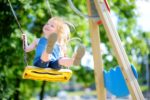Finding Happiness in Movement
Over the past 30 years unstructured outdoor play time has fallen by 50% while diagnoses of mental health issues such as ADHD, depression and anxiety in children have steadily risen. There is very little debate that physical activity is essential to every child’s physical health, but it is also an important part of a child’s emotional well-being.

Being physical makes us happy
With physical activity there is an increase in endorphins, the feel-good chemicals that are released in our brain during exercise. Often referred to as a “runner’s high”, this effect occurs with other forms of physical activity as well. In addition, exercise is meditation in motion. The mindfulness (or single minded focus) that it takes to play sports or do any physical activity helps a person leave behind the worry and tension of the day. The result of this is lower stress, an overall sense of calm and clarity, and a lightening of spirit. These effects result in relief from symptoms of anxiety and depression and improvements in mood. Another beneficial effect of physical activity is improved sleep. Poor sleep can be associated with anxiety, depression and poor academic performance in children. Well rested children are happy and productive. Regular exercise is an inexpensive and easy way to maintain and support a child’s emotional health.
Outdoors is even better
All physical activity will have a positive impact on a child’s emotional health, but adding an outdoor element has proven to be even more beneficial. Increased time in nature has been shown to result in improvements in self-esteem and self-confidence, as well as increases in compassion, wisdom and inner peace. Outdoor exercise brings with it relaxation and reductions in depression. This positive effect is strongest in middle childhood (ages 6-12) and establishing regular activity in this age group will help aid a child in establishing an active lifestyle that will carry forward to their adult life.
Getting your child moving
The key to get a child moving is to start by finding activities that children love. It will be less of a struggle to get them active if they are having fun. Keeping things social will help; try setting up playdates that include an outdoor physical activity. We are blessed with an abundance of local parks where a family can enjoy hikes to Kalamalka Lake Park, ski dates, biking, soccer at the park, even family games of tag. Watch for laughter and sounds of joy, then build on a child’s skills and support them in activities they love. Be sure to lead by example and make activity part of your everyday family time. All children over the age of two need 60 minutes of physical activity per day for their physical and emotional health. Help make sure they have that time.


